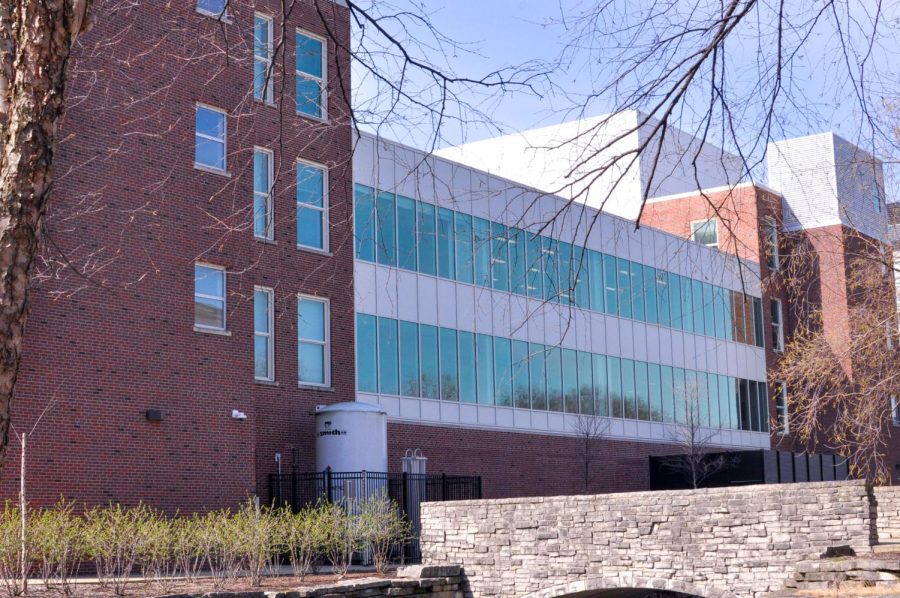Former graduate student voices concerns for misconduct in bioengineering research lab
Everitt Lab, located on Green Street, is the home for the bioengineering department when it comes to research and projects. Jinbei (Walden) Li, a former graduate student at the University, expresses concern of misconduct and behavior within labs.
April 15, 2022
Jinbei (Walden) Li, a former graduate student at the University who worked in a bioengineering lab run by Dr. Ting Lu, recently shared concerns about mistreatment and harsh behavior at the lab, which gained widespread attention on social media with over 400 thousand views on LinkedIn.
Li worked at Lu’s lab from February 2017 to August 2018. Li actually switched from a lab run by Dr. Huimin Zhao to Lu’s lab early on in his graduate studies.
“I was talking with Dr. Lu and the discussions were more vigorous and engaging between him and the students, which I really liked. We could really talk a lot about the details and specifics,” Li said.
Li described Lu as someone he could see himself working with for the next five years until he received his PhD. Li exchanged emails with Lu before working in his lab and described how Lu expected him to work hard and put in more hours than usual.
“Lu was really particular about pushing you to work a lot. I really felt that was no problem for me as I always put in extra hours and have always been self-driven, self-motivated and very passionate about what I do in the lab,” Li said.
Get The Daily Illini in your inbox!
As time passed, Li noted how the working environment was way harsher than he had expected and had no support from Lu. This was especially the case as Li said that Lu was absent for a majority of the time in the lab.
David Meldgin, another former graduate student who worked in Lu’s lab, said about a year in, the expectations rose considerably and that was when things started becoming concerning.
Meldgin noted how it also didn’t help that Lu would only be in the lab on Fridays during his one-on-one meetings with his students and absent for a great majority of the week.
“He expected to not need to provide as much assistance anymore. At that point, most of the meetings were ‘I want to look at a finished product. I do not want to talk about how to move things forward,’” Meldgin said.
When Li first joined, 60 hours of work per week was expected of him, which he said was nothing surprising for a research lab.
Slowly over time, Li described how Lu began enforcing the “996” work schedule — which is 9 a.m. to 9 p.m., 6 days a week — to all the Chinese students at his lab, which made up a majority of his student researchers.
Meldgin described how Lu behaved differently when he was around in the lab compared to when he was alone with the many Chinese graduate students.
“I was in the bathroom in the stall and he was saying rather rude things to a graduate student in the stall. I made a noise and that was when he immediately changed his tone,” Meldgin said.
Meldgin mentioned that there have been instances where Lu took things too far such as when Lu was yelling at one of his graduate students to the point where the student was left with a blank expression.
A common recurrence is Lu checking the lab at random times throughout the week to see if his graduate students were present and if not, they often had to explain their absence in depth, according to Meldgin.
“You feel like you are being distrusted and someone is watching you behind your back. When someone is forcing you to do what you are passionate about, it no longer stays a passion to you,” Li said.
Meldgin talked with other graduate students in the lab who described how they were working for almost 36 hours straight.
“At that point, you can’t do science. I don’t trust anyone to do anything effective after 36 hours without sleep,” Meldgin said.
A year into his graduate research, Li explained how doing research was no longer something he was doing for science. Rather, it became something to show to Lu that work was being done in the lab.
Closer to when Li was about to leave the lab, he noted how he still had great research ambition and thought maybe if he put in even more hours, things would gradually improve between him and Lu.
“At one point, I decided that research just cannot carry on in a reasonable way. His research management jumped between complete absences to micromanagement. He also doesn’t really listen to student ideas and felt everything should come from him,” Li said.
Li had voiced his concerns to the Department of Bioengineering and shortly after was contacted by the department head, Dr. Mark Anastasio, who said an investigation had begun.
In addition, Li was also contacted by the University’s Ethics and Compliance Office that deals with issues of discrimination.
“At first, my goal was to stop this lab from ruining other students’ careers. My second goal was for the College of Engineering to enact some policies and protocols so that students would have a way to seek help and deal with these things if they are in this kind of trouble,” Li said.
On April 8, an email was sent to all bioengineering students by Anastasio, he addressed some of the concerns and how they were investigating it.
After Li shared his LinkedIn post and it gained wide attraction, he described how his goal was to now have greater impact across academia as much as possible. He wants the University to lead the way and use his case as a catalyst so that situations like this can be better dealt with in the future.







